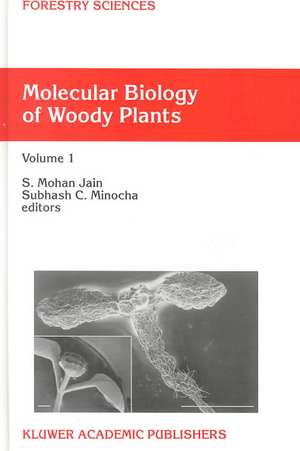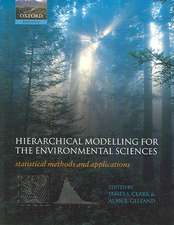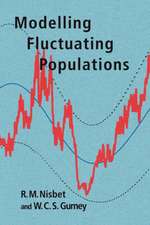Molecular Biology of Woody Plants: Volume 1: Forestry Sciences, cartea 64
Editat de S.M. Jain, S.C. Minochaen Limba Engleză Hardback – 30 noi 1999
| Toate formatele și edițiile | Preț | Express |
|---|---|---|
| Paperback (2) | 1227.84 lei 6-8 săpt. | |
| SPRINGER NETHERLANDS – 22 sep 2011 | 1227.84 lei 6-8 săpt. | |
| SPRINGER NETHERLANDS – 10 oct 2011 | 1234.14 lei 6-8 săpt. | |
| Hardback (2) | 1234.14 lei 6-8 săpt. | |
| SPRINGER NETHERLANDS – 30 apr 2000 | 1234.14 lei 6-8 săpt. | |
| SPRINGER NETHERLANDS – 30 noi 1999 | 1234.46 lei 6-8 săpt. |
Din seria Forestry Sciences
- 18%
 Preț: 958.56 lei
Preț: 958.56 lei -
 Preț: 388.13 lei
Preț: 388.13 lei - 15%
 Preț: 644.18 lei
Preț: 644.18 lei - 18%
 Preț: 1848.16 lei
Preț: 1848.16 lei - 18%
 Preț: 2105.44 lei
Preț: 2105.44 lei -
 Preț: 390.25 lei
Preț: 390.25 lei - 18%
 Preț: 950.33 lei
Preț: 950.33 lei -
 Preț: 390.84 lei
Preț: 390.84 lei - 18%
 Preț: 1226.73 lei
Preț: 1226.73 lei -
 Preț: 383.50 lei
Preț: 383.50 lei - 18%
 Preț: 950.33 lei
Preț: 950.33 lei - 18%
 Preț: 1234.77 lei
Preț: 1234.77 lei - 15%
 Preț: 637.28 lei
Preț: 637.28 lei -
 Preț: 387.58 lei
Preț: 387.58 lei -
 Preț: 385.62 lei
Preț: 385.62 lei - 18%
 Preț: 952.72 lei
Preț: 952.72 lei - 18%
 Preț: 1219.63 lei
Preț: 1219.63 lei - 18%
 Preț: 1229.73 lei
Preț: 1229.73 lei - 15%
 Preț: 647.59 lei
Preț: 647.59 lei - 18%
 Preț: 949.73 lei
Preț: 949.73 lei - 18%
 Preț: 946.10 lei
Preț: 946.10 lei - 18%
 Preț: 2762.55 lei
Preț: 2762.55 lei - 15%
 Preț: 644.95 lei
Preț: 644.95 lei - 18%
 Preț: 1840.26 lei
Preț: 1840.26 lei - 18%
 Preț: 1228.15 lei
Preț: 1228.15 lei - 18%
 Preț: 1236.69 lei
Preț: 1236.69 lei - 15%
 Preț: 639.73 lei
Preț: 639.73 lei - 18%
 Preț: 1847.21 lei
Preț: 1847.21 lei
Preț: 1234.46 lei
Preț vechi: 1505.44 lei
-18% Nou
Puncte Express: 1852
Preț estimativ în valută:
236.22€ • 247.25$ • 196.60£
236.22€ • 247.25$ • 196.60£
Carte tipărită la comandă
Livrare economică 31 martie-14 aprilie
Preluare comenzi: 021 569.72.76
Specificații
ISBN-13: 9780792360124
ISBN-10: 0792360125
Pagini: 524
Ilustrații: IX, 524 p. 31 illus.
Dimensiuni: 155 x 235 x 30 mm
Greutate: 0.93 kg
Ediția:2000
Editura: SPRINGER NETHERLANDS
Colecția Springer
Seria Forestry Sciences
Locul publicării:Dordrecht, Netherlands
ISBN-10: 0792360125
Pagini: 524
Ilustrații: IX, 524 p. 31 illus.
Dimensiuni: 155 x 235 x 30 mm
Greutate: 0.93 kg
Ediția:2000
Editura: SPRINGER NETHERLANDS
Colecția Springer
Seria Forestry Sciences
Locul publicării:Dordrecht, Netherlands
Public țintă
ResearchCuprins
Section I. Genetic Engineering and gene expression.- 1. Optimization of the expression of a transgene in plants.- 2. Genetic engineering of forest trees.- 3. Molecular biology of somatic embryogenesis in conifers.- 4. Molecular aspects of bud dormancy in trees.- 5. Options for genetic engineering of floral sterility in forest trees.- 6 Molecular control of the development and function of the vascular cambium.- 7. Genetic engineering of wood formation.- 8. Molecular biology of cellulose biosynthesis.- 9. Control of lignin biosynthesis.- 10. Molecular biology of tropical nitrogen-fixing trees in the Casuarinaceae family.- 11. Proteins of the conifer extracellular matrix.- 12. Gene expression during Pseudotsuga menziesii embryogenesis: Low molecular weight proteins.- Section II. Molecular Genetics.- 13. Tissue culture of woody plants and its relevance to molecular biology.- 14. Variation in woody plants: molecular markers, evolutionary processes and conservation biology.- 15. Molecular markers and genome mapping in woody plants.- 16. Assessment of biodiversity with molecular tools in forest trees.- 17. Mapping quantitative traits in forest trees.- 18. Somaclonal variation and genetic molecular markers in woody plants.- 19. Molecular breeding of Eucalyptus.- 20. Molecular dissection of quantitative traits: new perspectives from Populus.- 21. Molecular genetic analysis of pathogenic forest fungi.


















